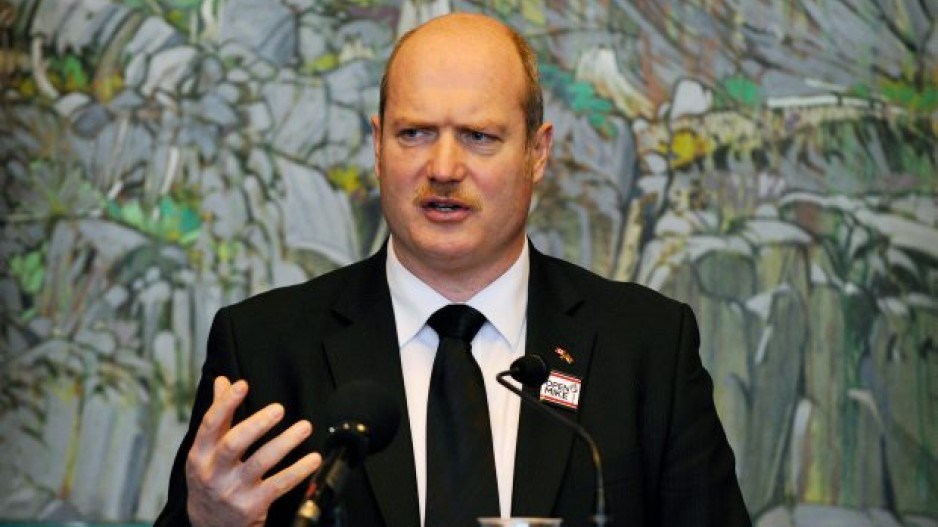In the provincial budget tabled February 17, Finance Minister Mike de Jong announced an expected surplus of $284 million for the 2015-16 fiscal year, down from $879 million in 2014-15.
Real GDP growth of 2.3% is forecast for 2015, a further 2.4% in 2016 and 2.3% in 2017.
There were only a few small changes revealed.
One of these changes is that there will be a 4% increase in Medical Services Plan (MSP) payments.
Bowing to pressure from the Opposition and anti-poverty advocates, Finance Minister Mike de Jong announced that government will stop clawing back child-support payments as of September 1.
“This means an additional $32 million over three years for some of the neediest children and families in British Columbia,” he told the legislature.
The change follows months of protests and ends the practice by which a single mother would have her income assistance cheque reduced by the exact amount she received in child support each month.
The new policy will benefit about 3,200 families and 5,400 children on income or disability assistance, the government said.
De Jong also announced that a single person now can earn more than $19,000 a year — up from $18,327 — before paying any provincial income tax. The change will cost the province about $5 million a year.
“Modest as it is, this measure will benefit roughly half a million taxpayers, letting them keep a little more of their hard-earned income,” de Jong said.
Government critics, however, were quick to point out that de Jong offered far greater relief for the rich than he did for the poor.
People earning $150,000 or more a year will receive a $200-million tax break later this year with the expiration of a two-per-cent increase to their personal income tax.
By comparison, ending the clawback will cost the government $13 million a year, said Iglika Ivanova, a senior economist with the Canadian Centre for Policy Alternatives.
“Budgets are about choices and priorities,” she said. “I don’t think the priorities are in the best interests of British Columbians when you consider that the richest 2% of British Columbians are getting 17 times more than the poorest single moms. So that’s a big difference.”
The B.C. Government and Service Employees Union also raises concerns that government plans to offset the cost of ending the clawback by trimming $4 million from the Family Maintenance Program. No layoffs are expected, but employees will be shifted to other jobs.
Union president Stephanie Smith expressed concern that the cuts will make it more difficult for parents to pursue child support payments from deadbeat spouses.
“Instead of it being mandatory to have family maintenance worker, it now appears it will be voluntary, so that’s causing us concern,” she said.
“I guess one way in which to characterize this is, ‘On one hand we giveth, on the other hand we taketh away.’”
Businesses were more supportive of the budget.
Iain Black, president of the Vancouver Board of Trade, applauded de Jong’s conservative approach.
“There’s always going to be appetite to spend more money on programs,” he said. “There’s always going to be an appetite to spend more money on capital projects. But, I think at this stage in our history, with all of the uncertainty that’s out there, you’ve got to take care of your books when you have the chance.”
Jock Finlayson of the Business Council of B.C. said the budget will increase the confidence of his members.
“I think taxpayers in B.C. can feel, on the whole, pretty good that our province is in good health financially, and our economy is doing better than a lot of other jurisdictions around the world,” he said. “This budget, I think, will continue to advance that.”
Budget highlights
- Medical Service Plan premiums will increase by four per cent on Jan. 1, 2016. For a family of three or more, that represent an increase of $6 a month to $150.
- Health spending will increase by nearly $3 billion over three years. Government will spend an extra $10 million to increase the number of hospice beds
- Total government spending of $45.8 billion in 2015-16 on revenues of $46.3 billion with a projected surplus of $284 million.
- K-12 education will get an extra $564 million over three years, largely to cover labour agreements
- The budget surplus for 2014-15 is now forecast at $879 million, nearly double the prediction in December.
- Government predicts 2.3 per cent economic growth in 2015, rising to 2.4 per cent in 2016.
- The cement industry will receive $22 million in incentives over three years to produce their product more cleanly
- The Ministry of Energy and Mines will get an extra $6.3 million to improve permitting and mine oversight.
- Community Living B.C. will get an additional $106 million over three years to serve adults with developmental disabilities
- Families can claim a children’s fitness equipment tax credit worth $12.65 per child annually
- Income assistance programs will receive an additional $20 million in 2016-17
- Government will spend $25 million over three years to modernize B.C.’s water laws, regulate groundwater use and improve provincial water management




